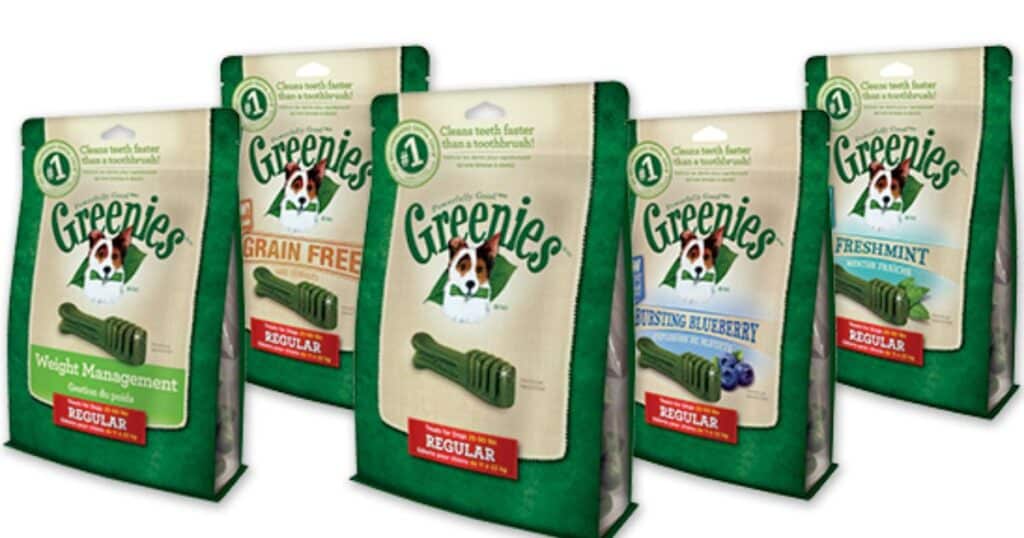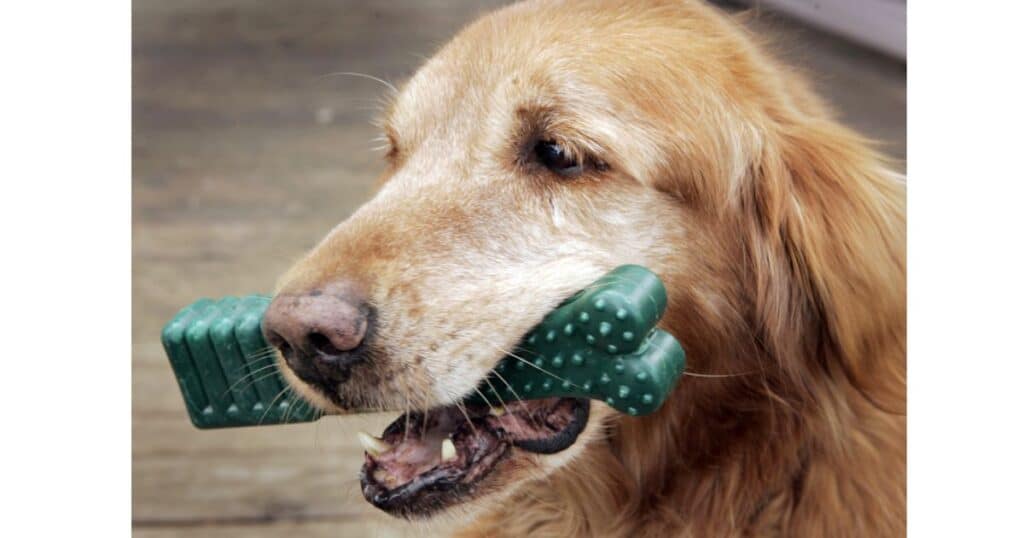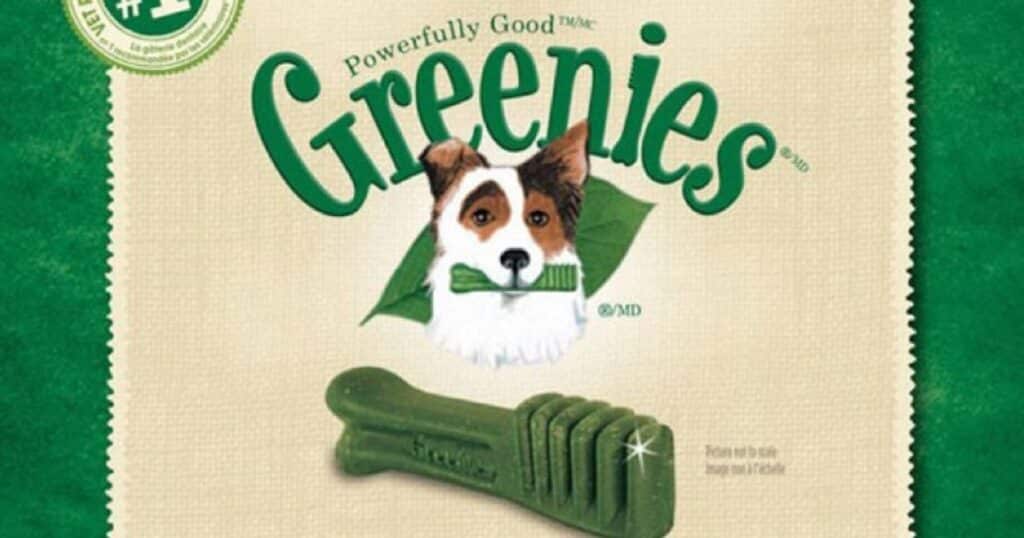As a dog owner, you want nothing but the best for your furry friend. You carefully choose their food, take them for regular check-ups, and even treat them to special goodies now and then. But what if one of those treats could be harmful? That’s the question at the heart of the Greenies controversy. These popular dental chews have been both praised and criticized, leaving many pet parents wondering: do Greenies cause cancer in dogs?
In this comprehensive guide, we’ll sink our teeth into this meaty issue, examining the facts, the science, and the expert opinions. We’ll explore the benefits and potential risks of Greenies, delve into the world of canine health, and provide you with the information you need to make informed decisions about your dog’s diet and oral health.
The Greenies Controversy: Bark or Bite?

Rumors vs. Facts
The internet is a breeding ground for rumors, and the pet world is no exception. Claims about Greenies causing cancer in dogs have spread like wildfire on social media and pet forums. But before we panic, let’s separate the wheat from the chaff.
Common claims circulating online:
- Greenies contain carcinogenic ingredients
- Dogs who regularly eat Greenies have higher cancer rates
- The treats cause digestive blockages that lead to cancer
These alarming statements have understandably caused concern among dog owners. However, it’s crucial to approach such claims with a critical eye and look for evidence-based information.
Origin of Cancer Concerns
To understand the controversy, we need to trace its roots. The concerns about Greenies didn’t start with cancer claims. Initially, the treats faced scrutiny due to reports of digestive issues and choking hazards.
In the early 2000s, several incidents were reported where dogs experienced complications after consuming Greenies. While these cases were primarily related to digestive blockages rather than cancer, they sparked a broader debate about the safety of the treats.
As discussions about Greenies’ safety evolved, some pet owners and alternative health advocates began to question the long-term effects of the treats, including potential links to cancer. However, it’s important to note that these concerns were largely speculative and not based on scientific studies at the time.
What’s the Scoop on Greenies?
Before we can assess any potential risks, we need to understand what Greenies are and what they’re made of.
Ingredients Breakdown
Greenies are dental chews designed to clean dogs’ teeth and freshen their breath. Let’s take a closer look at their ingredients:
| Main Ingredients | Purpose |
| Wheat flour | Provides structure and texture |
| Glycerin | Maintains moisture and softness |
| Gelatin | Binds ingredients and adds protein |
| Cellulose powder | Adds fiber and aids in dental cleaning |
| Natural poultry flavor | Enhances taste |
| Lecithin | Emulsifier for consistency |
| Vitamins and minerals | Nutritional supplementation |
Some ingredients have raised eyebrows among pet owners, particularly:
- Wheat flour: Some dogs have wheat allergies or sensitivities
- Artificial colors: Used in some varieties, raising concerns about unnecessary additives
- Gelatin: While generally safe, some worry about its source and quality
Intended Benefits for Dogs
Greenies are marketed as more than just tasty dog treats. They’re designed to provide several benefits:
- Dental health: The chewy texture is meant to scrape plaque and tartar off teeth
- Fresh breath: Ingredients are chosen to combat bad breath
- Nutrient supplementation: Added vitamins and minerals contribute to overall health
- Weight management: Controlled calorie content for portion control
These intended benefits have made Greenies a popular choice among dog owners looking to maintain their pet’s oral health between brushings or veterinary cleanings.
Canine Cancer 101
To put the Greenies controversy in context, we need to understand cancer in dogs. Cancer is a significant health concern for our canine companions, affecting many dogs as they age.
Common Types
Dogs can develop various types of cancer, some more common than others. Here’s a breakdown of the most prevalent canine cancers:
- Lymphoma: Affects the lymph nodes and lymphatic system
- Mast Cell Tumors: Skin cancer that can spread to internal organs
- Osteosarcoma: Aggressive bone cancer
- Hemangiosarcoma: Cancer of blood vessel cells, often affecting the spleen
- Melanoma: Skin cancer that can also occur in the mouth
Did you know? According to the American Veterinary Medical Association, cancer accounts for nearly 50% of all disease-related deaths in dogs over the age of 10.
Warning Signs
As a responsible pet owner, it’s crucial to be aware of potential cancer symptoms in dogs. Early detection can significantly improve treatment outcomes. Watch for these warning signs:
- Unusual lumps or bumps that persist or grow
- Sores that don’t heal
- Weight loss
- Loss of appetite
- Bleeding or discharge from any body opening
- Difficulty eating or swallowing
- Reluctance to exercise or loss of stamina
- Persistent lameness or stiffness
- Difficulty breathing, urinating, or defecating
If you notice any of these symptoms, don’t hesitate to consult your veterinarian. Remember, these signs don’t necessarily mean your dog has cancer, but they warrant professional attention.
The Science Behind Greenies: Chewing on the Facts

Now that we understand the basics of Greenies and canine cancer, let’s examine the scientific evidence behind these popular dental chews.
Dental Benefits
Greenies are primarily marketed for their dental benefits. But do they live up to the hype?
A study published in the Journal of Veterinary Dentistry in 2017 found that:
- Dogs given Greenies showed a 60% reduction in plaque accumulation
- Tartar buildup was reduced by 33% compared to dogs not given dental chews
However, it’s important to note that while Greenies can contribute to dental health, they’re not a substitute for regular teeth brushing and professional cleanings.
Nutritional Analysis
Beyond dental health, let’s look at what Greenies offer nutritionally:
- Calories: An average Greenies treat contains about 90 calories
- Protein: 30% minimum
- Fat: 5.5% minimum
- Fiber: 6% maximum
Greenies also contain added vitamins and minerals, including:
- Vitamin A
- Vitamin B12
- Vitamin D3
- Vitamin E
- Calcium
- Phosphorus
While these nutrients can contribute to overall health, it’s crucial to remember that Greenies should be given as treats, not as a primary source of nutrition.
Digging into the Cancer Claim
Now, let’s address the elephant in the room: the alleged link between Greenies and cancer in dogs.
Research Studies
Despite the circulating rumors, there’s a notable lack of scientific studies directly linking Greenies to cancer in dogs. Most of the concerns stem from anecdotal reports and speculation rather than rigorous research.
However, some studies have examined the broader topic of dog treats and health:
- A 2019 study published in the Journal of Animal Science found no significant correlation between dental chew consumption and cancer rates in dogs.
- Research from the University of Agricultural Sciences in Sweden (2020) investigated the presence of potentially harmful compounds in various dog chews. While some chews contained concerning levels of certain chemicals, Greenies were not specifically identified as problematic.
It’s important to note that the absence of evidence is not evidence of absence. More research is needed to definitively rule out any long-term health effects of Greenies.
Expert Opinions
To get a balanced perspective, let’s consider what veterinary experts have to say about Greenies and cancer risk:
“While we always need to be cautious about what we feed our pets, there’s currently no scientific evidence linking Greenies to cancer in dogs. However, as with any treat, moderation is key.” – Dr. Sarah Thompson, DVM, Veterinary Oncologist
“Dental health is crucial for overall canine well-being. Greenies can be part of a comprehensive oral care routine, but they shouldn’t replace regular brushing or professional cleanings.” – Dr. Mark Johnson, Veterinary Dentist
These expert opinions suggest that while Greenies aren’t likely to cause cancer, they should be used as part of a balanced diet and dental care routine.
Vets Speak: Greenies on Trial
To further explore the safety and efficacy of Greenies, let’s hear from veterinarians who have firsthand experience with these dental chews.
Testimonies and Experiences
Dr. Lisa Chen, a small animal practitioner with 15 years of experience, shares her thoughts:
“I’ve recommended Greenies to many of my clients over the years, particularly for dogs with mild dental issues. In my experience, when used as directed, they can be an effective part of a dental care routine. I haven’t seen any evidence in my practice to suggest they cause cancer or other serious health issues.”
Dr. Robert Davis, an emergency veterinarian, offers a different perspective:
“While I haven’t seen cancer cases linked to Greenies, I have treated a few dogs for digestive blockages caused by large pieces of poorly chewed Greenies. It’s crucial that owners choose the right size for their dog and supervise chewing.”
Recommendations for Dog Owners
Based on veterinary insights, here are some recommendations for using Greenies safely:
- Choose the right size: Ensure the Greenie is appropriate for your dog’s weight and chewing habits
- Supervise chewing: Watch your dog to make sure they’re not swallowing large pieces
- Limit intake: Follow the recommended daily allowance based on your dog’s weight
- Consider alternatives: If your dog has sensitive digestion, explore other dental care options
- Maintain regular check-ups: Keep up with veterinary visits to monitor your dog’s overall health and dental condition
Remember, veterinarian advice should always be your primary source of guidance when it comes to your dog’s health and diet.
Treat Safety: More Than Just a Bone of Contention
When it comes to dog treats like Greenies, safety isn’t just about the ingredients—it’s also about how they’re made and regulated.
Regulatory Standards
In the United States, pet treats fall under the jurisdiction of the Food and Drug Administration (FDA). However, the regulations for pet food and treats are less stringent than those for human food.
Key points about pet treat regulation:
- Manufacturers are responsible for ensuring their products are safe and properly labeled
- The FDA can take action if a product is found to be unsafe or improperly labeled
- There’s no pre-market approval required for most pet treats
This regulatory landscape means that pet owners need to be proactive in researching and choosing safe treats for their dogs.
Quality Control
Greenies’ manufacturer, Mars Petcare, has implemented various quality control measures:
- Ingredient sourcing: They claim to use high-quality, traceable ingredients
- Manufacturing processes: Production follows Good Manufacturing Practices (GMPs)
- Testing: Products undergo testing for safety and efficacy
However, like any mass-produced product, Greenies have faced recalls in the past. In 2006, there was a voluntary recall due to potential choking hazards. This led to a reformulation of the product to make it more easily digestible.
Beyond Greenies: Other Options to Chew On
While Greenies are popular, they’re not the only option for maintaining your dog’s oral health. Let’s explore some alternatives:
Natural Alternatives
Many pet owners prefer natural options for their dogs. Here are some natural dental treats to consider:
- Raw carrots: Crunchy and low in calories
- Apple slices: Rich in vitamins and fiber (remove seeds and core)
- Dried sweet potato strips: Chewy and nutritious
- Bully sticks: Made from beef muscle, they’re long-lasting chews
Remember, even natural treats should be given in moderation and under supervision.
DIY Dental Delights
For the hands-on pet parent, here’s a simple recipe for homemade dental treats:
Minty Fresh Dog Treats
Ingredients:
- 2 1/2 cups whole wheat flour
- 1/2 cup fresh parsley, finely chopped
- 1/4 cup fresh mint, finely chopped
- 1 egg
- 1/4 cup water
- 3 tablespoons coconut oil
Instructions:
- Preheat oven to 350°F (175°C)
- Mix all ingredients to form a dough
- Roll out and cut into desired shapes
- Bake for 20-25 minutes until golden brown
- Cool completely before serving
These treats combine the abrasive action of whole wheat flour with the breath-freshening properties of parsley and mint.
Keeping Cancer at Bay: Preventive Measures
While the link between Greenies and cancer remains unproven, cancer prevention is a crucial aspect of canine health. Here are some strategies to help reduce your dog’s cancer risk:
Diet and Exercise
- Balanced nutrition: Feed a high-quality, age-appropriate diet
- Maintain healthy weight: Obesity is linked to increased cancer risk in dogs
- Regular exercise: Aim for at least 30 minutes of activity daily
- Limit processed foods: Opt for whole, natural ingredients when possible
- Consider antioxidants: Foods rich in vitamins C and E may help fight free radicals
Regular Vet Check-ups
Early detection is key in successfully treating canine cancer. Regular veterinary visits can help catch potential issues early:
- Schedule annual check-ups for younger dogs
- Increase to bi-annual visits for senior dogs
- Don’t skip recommended screenings or tests
- Report any unusual symptoms or behaviors promptly
Remember, your veterinarian is your best ally in maintaining your dog’s health and preventing serious illnesses like cancer.
Understanding Cancer Risk Factors in Dogs

To put the Greenies controversy in perspective, it’s important to understand the known risk factors for cancer in dogs.
Genetics
Some dog breeds have a higher predisposition to certain types of cancer:
- Golden Retrievers: Higher risk of lymphoma and hemangiosarcoma
- Boxers: Increased risk of mast cell tumors
- Rottweilers: More prone to osteosarcoma
Genetic testing can sometimes help identify dogs at higher risk, allowing for more targeted preventive measures.
Environmental Toxins
Various environmental factors can contribute to cancer risk in dogs:
- Secondhand smoke: Increases risk of nasal and lung cancers
- Herbicides and pesticides: Linked to higher lymphoma rates
- UV radiation: Can cause skin cancer, especially in short-haired breeds
- Industrial chemicals: Exposure to certain chemicals may increase cancer risk
Reducing exposure to these toxins can help lower your dog’s cancer risk.
Treat Selection 101: Choosing Wisely for Your Woofer
Whether you opt for Greenies or other dog treats, making informed choices is crucial. Here’s how to select safe, healthy treats for your furry friend:
Label Reading for Dog Parents
Become a pro at decoding treat labels:
- Check the ingredient list: Look for recognizable, whole food ingredients
- Watch for allergens: Be aware of common dog allergens like wheat, soy, and dairy
- Avoid artificial preservatives: Look for natural preservatives like vitamin E (mixed tocopherols)
- Check calorie content: Treats should make up no more than 10% of your dog’s daily calorie intake
- Look for AAFCO statement: This indicates the treat meets basic nutritional standards
Red Flags in Treat Ingredients
Be wary of these potentially problematic ingredients:
- Artificial colors: Unnecessary and potentially harmful
- BHA, BHT, and ethoxyquin: Artificial preservatives with potential health risks
- Propylene glycol: Used as a moistening agent, but can be harmful in large quantities
- Meat by-products: Often lower quality than whole meat ingredients
- Excess sugar or salt: Can contribute to obesity and other health issues
By being an informed consumer, you can choose treats that contribute positively to your dog’s health and well-being.
Your Role in Your Dog’s Health

As a pet parent, you play a crucial role in maintaining your dog’s health, including their dental care and treat consumption.
Monitoring Treat Intake
Even with healthy treats like Greenies, moderation is key:
- Follow package guidelines for daily allowance
- Adjust treat portions based on your dog’s weight and activity level
- Account for treat calories in your dog’s overall diet
- Observe how your dog reacts to new treats
Staying Informed
Keep yourself updated on pet health topics:
- Follow reputable pet health websites: Such as the American Veterinary Medical Association (avma.org)
- Attend pet health seminars: Many veterinary clinics offer educational events
- Read scientific journals: For those interested in deeper research
- Consult with your vet: They can provide personalized advice and latest information
Remember, your commitment to learning and staying informed directly benefits your furry friend’s health and happiness.
Conclusion
The question “Do Greenies cause cancer in dogs?” has stirred up quite a debate in the pet world. After chewing over the evidence, expert opinions, and scientific research, we can draw some conclusions:
- There’s currently no scientific evidence directly linking Greenies to cancer in dogs.
- Greenies can offer dental benefits when used as part of a comprehensive oral care routine.
- As with any treat, moderation is key, and proper size selection is crucial for safety.
- While Greenies have faced some controversies, most concerns relate to digestive issues rather than cancer.
- The overall safety of Greenies appears to be on par with other commercially available dog treats.
However, it’s important to remember that research in this area is ongoing, and our understanding may evolve as new studies emerge.
As a responsible pet owner, the best approach is to:
- Stay informed about your dog’s nutritional needs
- Consult with your veterinarian about the best dental care options for your pet
- Monitor your dog’s health closely and report any concerns promptly
- Consider a variety of dental care options, including brushing, professional cleanings, and a range of dental treats
Ultimately, the decision to use Greenies or any other dental chew should be made in consultation with your veterinarian, taking into account your dog’s individual health needs, dental condition, and dietary requirements.
Remember, while treats like Greenies can contribute to dental health, they’re not a substitute for regular veterinary check-ups and a balanced diet. Your dog’s overall health is influenced by many factors, including genetics, environment, diet, and lifestyle.
By staying informed, working closely with your vet, and making thoughtful choices about your dog’s diet and care, you can help ensure your furry friend leads a happy, healthy life – with or without Greenies.
MORE POST: Can Dogs Eat Cinnamon Toast Crunch Safely?
FAQs
To wrap up our deep dive into the world of Greenies and canine health, let’s address some frequently asked questions:
Q: Are Greenies safe for all dogs?
A: While Greenies are generally safe for most dogs, they may not be suitable for dogs with certain health conditions or allergies. Always consult with your vet before introducing new treats.
Q: How often should I give my dog Greenies?
A: Follow the package guidelines based on your dog’s weight. Generally, one Greenie per day is recommended for most dogs.
Q: Can Greenies replace teeth brushing?
A: No, Greenies should complement, not replace, regular teeth brushing and professional dental cleanings.
Q: Are there any alternatives to Greenies for dental health?
A: Yes, there are many alternatives including other dental chews, raw vegetables like carrots, and specially formulated dental diets. Discuss options with your veterinarian.
Q: What should I do if I suspect my dog has cancer?
A: If you notice any unusual symptoms or changes in your dog’s behavior, consult your veterinarian immediately. Early detection is crucial for successful treatment.
Q: Are there any natural ways to prevent cancer in dogs?
A: While there’s no guaranteed way to prevent cancer, maintaining a healthy weight, providing a balanced diet, ensuring regular exercise, and minimizing exposure to known carcinogens can help reduce the risk.
.

Davin Connor is an experienced author with 3 years in pets writing. Known for concise, informative content, he shares expertise on pet care, behavior, and health through his engaging articles.






